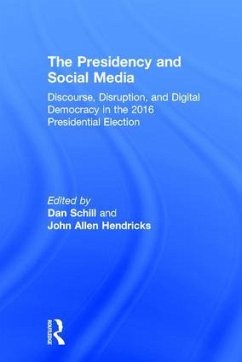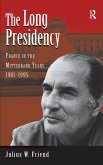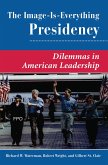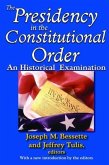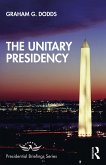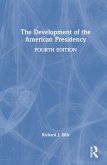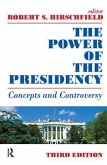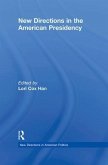The Presidency and Social Media
Discourse, Disruption, and Digital Democracy in the 2016 Presidential Election
Herausgeber: Schill, Dan; Hendricks, John Allen
The Presidency and Social Media
Discourse, Disruption, and Digital Democracy in the 2016 Presidential Election
Herausgeber: Schill, Dan; Hendricks, John Allen
- Gebundenes Buch
- Merkliste
- Auf die Merkliste
- Bewerten Bewerten
- Teilen
- Produkt teilen
- Produkterinnerung
- Produkterinnerung
The Presidency and Social Media includes top scholars from leading research institutions using various research methodologies to generate new understandings-both theoretical and practical-for students, researchers, journalists, and practitioners.
Andere Kunden interessierten sich auch für
![The Long Presidency The Long Presidency]() Julius W FriendThe Long Presidency199,99 €
Julius W FriendThe Long Presidency199,99 €![The Image Is Everything Presidency The Image Is Everything Presidency]() Richard W. WatermanThe Image Is Everything Presidency198,99 €
Richard W. WatermanThe Image Is Everything Presidency198,99 €![The Presidency in the Constitutional Order The Presidency in the Constitutional Order]() The Presidency in the Constitutional Order221,99 €
The Presidency in the Constitutional Order221,99 €![The Unitary Presidency The Unitary Presidency]() Graham G. DoddsThe Unitary Presidency198,99 €
Graham G. DoddsThe Unitary Presidency198,99 €![The Development of the American Presidency The Development of the American Presidency]() Richard J. EllisThe Development of the American Presidency197,99 €
Richard J. EllisThe Development of the American Presidency197,99 €![The Power of the Presidency The Power of the Presidency]() The Power of the Presidency221,99 €
The Power of the Presidency221,99 €![New Directions in the American Presidency New Directions in the American Presidency]() New Directions in the American Presidency242,99 €
New Directions in the American Presidency242,99 €-
-
-
The Presidency and Social Media includes top scholars from leading research institutions using various research methodologies to generate new understandings-both theoretical and practical-for students, researchers, journalists, and practitioners.
Hinweis: Dieser Artikel kann nur an eine deutsche Lieferadresse ausgeliefert werden.
Hinweis: Dieser Artikel kann nur an eine deutsche Lieferadresse ausgeliefert werden.
Produktdetails
- Produktdetails
- Verlag: Routledge
- Seitenzahl: 390
- Erscheinungstermin: 26. Oktober 2017
- Englisch
- Abmessung: 222mm x 145mm x 24mm
- Gewicht: 621g
- ISBN-13: 9781138081536
- ISBN-10: 1138081531
- Artikelnr.: 49779693
- Herstellerkennzeichnung
- Libri GmbH
- Europaallee 1
- 36244 Bad Hersfeld
- gpsr@libri.de
- Verlag: Routledge
- Seitenzahl: 390
- Erscheinungstermin: 26. Oktober 2017
- Englisch
- Abmessung: 222mm x 145mm x 24mm
- Gewicht: 621g
- ISBN-13: 9781138081536
- ISBN-10: 1138081531
- Artikelnr.: 49779693
- Herstellerkennzeichnung
- Libri GmbH
- Europaallee 1
- 36244 Bad Hersfeld
- gpsr@libri.de
Dan Schill is Associate Professor in the School of Communication Studies and Affiliate Professor in Political Science at James Madison University, where he teaches courses in advocacy, political communication, research methods, and media and politics. His research focuses on communication, politics, media, and technology. John Allen Hendricks is Chair of the Department of Mass Communication and Professor at Stephen F. Austin State University, where he teaches courses in communication theory, research methods, First Amendment law, and media and politics. Dr. Hendricks has authored/edited more than ten books on the topics of media/politics, social media/new media technologies, and the broadcasting industry.
Foreword [Thomas E. Patterson] Preface Part 1: Media Use: Political
Engagement & Digital Democracy 1. Discourse, Disruption, and Digital
Democracy: Political Communication in the 2016 Presidential Campaign [Dan
Schill and John Allen Hendricks] 2. Social Media, News Platforms, and
Partisan Exposure: Voters' Media Preferences During the 2016 Presidential
Campaign Season [Michael A. Beam, Paul M. Haridakis, Myiah J. Hutchens, and
Jay D. Hmielowski] 3. Trump Supporters vs. Republican Voters: How
Frustration with the Media Separated the GOP in 2016 [Sharon E. Jarvis and
Jay T. Jennings] 4. Online Communication Regarding Ohio's 2016 Presidential
Primary [Jeffrey H. Kuznekoff, Leland G. Spencer, and Robert N. Burt] Part
2: Media Effects: Traditional Media & Social Media Distribution 5. Foreign
Policy and Presidential Elections: A Look at the Iowa Caucuses [Raluca
Cozma] 6. The Effects of Political Social Media Use on Efficacy and
Cynicism in the 2016 Presidential Election: Exploring the Possibility of a
Reinforcing Spiral [Benjamin R. Warner, Molly M. Greenwood, Freddie J.
Jennings, and Josh C. Bramlett] 7. Streaming entertainment and talking
politics: Social television in the shaping of online and offline political
talk during the 2016 campaign [Sarah Krongard and Jacob Groshek] Part 3:
Candidate Discourse in Social Media: Image, Tone, & Rhetoric 8. The Verbal
Tone of the 2016 Presidential Primaries: Candidate Twitter, Debate, and
Campaign Speech Rhetoric [David Lynn Painter and Katherine Rizzo] 9. Themes
in Candidate Messaging on Twitter During the 'Invisible' Presidential
Primary[Kate Kenski and Christine R. Filer] 10. Rhetoric in a Transmedia
Storytelling Campaign: How Trump Deployed the Paranoid Style in 2016 [Zac
Gershberg] 11. Humor use and Policy Mentions in Candidate Interviews across
Talk-show Sub-Genres in the 2016 Presidential Election [Dannagal G. Young
and Johanna M. Lukk] Part 4: Social Media Messaging: Candidate Branding &
Agenda Setting 12. Donald Trump and the "Oxygen of Publicity": Branding,
Social Media, and Traditional Media [Sarah Oates and Wendy W. Moe] 13. The
Infographic Election: The Role of Visual Content on Social Media in the
2016 Presidential Campaign [Terri L. Towner] 14. Tweets as Tools: Exploring
the Campaign Functions of Candidates' Tweets in the 2016 Presidential
Campaign[Thomas Kim Hixson] Part 5: Social Media Content: Political
Participation & Humor 15. Internet Memes as Polyvocal Political
Participation [Andrew S. Ross and Damian J. Rivers] 16. Engaged Brigade:
Digital Platforms and Millennial Engagement in the 2016 Election [Alison N.
Novak] 17. Donald Trump and the Late-Night Political Humor of Campaign
2016: All The Donald, All the Time [Stephen J. Farnsworth, S. Robert
Lichter, and Deanne Canieso]
Engagement & Digital Democracy 1. Discourse, Disruption, and Digital
Democracy: Political Communication in the 2016 Presidential Campaign [Dan
Schill and John Allen Hendricks] 2. Social Media, News Platforms, and
Partisan Exposure: Voters' Media Preferences During the 2016 Presidential
Campaign Season [Michael A. Beam, Paul M. Haridakis, Myiah J. Hutchens, and
Jay D. Hmielowski] 3. Trump Supporters vs. Republican Voters: How
Frustration with the Media Separated the GOP in 2016 [Sharon E. Jarvis and
Jay T. Jennings] 4. Online Communication Regarding Ohio's 2016 Presidential
Primary [Jeffrey H. Kuznekoff, Leland G. Spencer, and Robert N. Burt] Part
2: Media Effects: Traditional Media & Social Media Distribution 5. Foreign
Policy and Presidential Elections: A Look at the Iowa Caucuses [Raluca
Cozma] 6. The Effects of Political Social Media Use on Efficacy and
Cynicism in the 2016 Presidential Election: Exploring the Possibility of a
Reinforcing Spiral [Benjamin R. Warner, Molly M. Greenwood, Freddie J.
Jennings, and Josh C. Bramlett] 7. Streaming entertainment and talking
politics: Social television in the shaping of online and offline political
talk during the 2016 campaign [Sarah Krongard and Jacob Groshek] Part 3:
Candidate Discourse in Social Media: Image, Tone, & Rhetoric 8. The Verbal
Tone of the 2016 Presidential Primaries: Candidate Twitter, Debate, and
Campaign Speech Rhetoric [David Lynn Painter and Katherine Rizzo] 9. Themes
in Candidate Messaging on Twitter During the 'Invisible' Presidential
Primary[Kate Kenski and Christine R. Filer] 10. Rhetoric in a Transmedia
Storytelling Campaign: How Trump Deployed the Paranoid Style in 2016 [Zac
Gershberg] 11. Humor use and Policy Mentions in Candidate Interviews across
Talk-show Sub-Genres in the 2016 Presidential Election [Dannagal G. Young
and Johanna M. Lukk] Part 4: Social Media Messaging: Candidate Branding &
Agenda Setting 12. Donald Trump and the "Oxygen of Publicity": Branding,
Social Media, and Traditional Media [Sarah Oates and Wendy W. Moe] 13. The
Infographic Election: The Role of Visual Content on Social Media in the
2016 Presidential Campaign [Terri L. Towner] 14. Tweets as Tools: Exploring
the Campaign Functions of Candidates' Tweets in the 2016 Presidential
Campaign[Thomas Kim Hixson] Part 5: Social Media Content: Political
Participation & Humor 15. Internet Memes as Polyvocal Political
Participation [Andrew S. Ross and Damian J. Rivers] 16. Engaged Brigade:
Digital Platforms and Millennial Engagement in the 2016 Election [Alison N.
Novak] 17. Donald Trump and the Late-Night Political Humor of Campaign
2016: All The Donald, All the Time [Stephen J. Farnsworth, S. Robert
Lichter, and Deanne Canieso]
Foreword [Thomas E. Patterson] Preface Part 1: Media Use: Political
Engagement & Digital Democracy 1. Discourse, Disruption, and Digital
Democracy: Political Communication in the 2016 Presidential Campaign [Dan
Schill and John Allen Hendricks] 2. Social Media, News Platforms, and
Partisan Exposure: Voters' Media Preferences During the 2016 Presidential
Campaign Season [Michael A. Beam, Paul M. Haridakis, Myiah J. Hutchens, and
Jay D. Hmielowski] 3. Trump Supporters vs. Republican Voters: How
Frustration with the Media Separated the GOP in 2016 [Sharon E. Jarvis and
Jay T. Jennings] 4. Online Communication Regarding Ohio's 2016 Presidential
Primary [Jeffrey H. Kuznekoff, Leland G. Spencer, and Robert N. Burt] Part
2: Media Effects: Traditional Media & Social Media Distribution 5. Foreign
Policy and Presidential Elections: A Look at the Iowa Caucuses [Raluca
Cozma] 6. The Effects of Political Social Media Use on Efficacy and
Cynicism in the 2016 Presidential Election: Exploring the Possibility of a
Reinforcing Spiral [Benjamin R. Warner, Molly M. Greenwood, Freddie J.
Jennings, and Josh C. Bramlett] 7. Streaming entertainment and talking
politics: Social television in the shaping of online and offline political
talk during the 2016 campaign [Sarah Krongard and Jacob Groshek] Part 3:
Candidate Discourse in Social Media: Image, Tone, & Rhetoric 8. The Verbal
Tone of the 2016 Presidential Primaries: Candidate Twitter, Debate, and
Campaign Speech Rhetoric [David Lynn Painter and Katherine Rizzo] 9. Themes
in Candidate Messaging on Twitter During the 'Invisible' Presidential
Primary[Kate Kenski and Christine R. Filer] 10. Rhetoric in a Transmedia
Storytelling Campaign: How Trump Deployed the Paranoid Style in 2016 [Zac
Gershberg] 11. Humor use and Policy Mentions in Candidate Interviews across
Talk-show Sub-Genres in the 2016 Presidential Election [Dannagal G. Young
and Johanna M. Lukk] Part 4: Social Media Messaging: Candidate Branding &
Agenda Setting 12. Donald Trump and the "Oxygen of Publicity": Branding,
Social Media, and Traditional Media [Sarah Oates and Wendy W. Moe] 13. The
Infographic Election: The Role of Visual Content on Social Media in the
2016 Presidential Campaign [Terri L. Towner] 14. Tweets as Tools: Exploring
the Campaign Functions of Candidates' Tweets in the 2016 Presidential
Campaign[Thomas Kim Hixson] Part 5: Social Media Content: Political
Participation & Humor 15. Internet Memes as Polyvocal Political
Participation [Andrew S. Ross and Damian J. Rivers] 16. Engaged Brigade:
Digital Platforms and Millennial Engagement in the 2016 Election [Alison N.
Novak] 17. Donald Trump and the Late-Night Political Humor of Campaign
2016: All The Donald, All the Time [Stephen J. Farnsworth, S. Robert
Lichter, and Deanne Canieso]
Engagement & Digital Democracy 1. Discourse, Disruption, and Digital
Democracy: Political Communication in the 2016 Presidential Campaign [Dan
Schill and John Allen Hendricks] 2. Social Media, News Platforms, and
Partisan Exposure: Voters' Media Preferences During the 2016 Presidential
Campaign Season [Michael A. Beam, Paul M. Haridakis, Myiah J. Hutchens, and
Jay D. Hmielowski] 3. Trump Supporters vs. Republican Voters: How
Frustration with the Media Separated the GOP in 2016 [Sharon E. Jarvis and
Jay T. Jennings] 4. Online Communication Regarding Ohio's 2016 Presidential
Primary [Jeffrey H. Kuznekoff, Leland G. Spencer, and Robert N. Burt] Part
2: Media Effects: Traditional Media & Social Media Distribution 5. Foreign
Policy and Presidential Elections: A Look at the Iowa Caucuses [Raluca
Cozma] 6. The Effects of Political Social Media Use on Efficacy and
Cynicism in the 2016 Presidential Election: Exploring the Possibility of a
Reinforcing Spiral [Benjamin R. Warner, Molly M. Greenwood, Freddie J.
Jennings, and Josh C. Bramlett] 7. Streaming entertainment and talking
politics: Social television in the shaping of online and offline political
talk during the 2016 campaign [Sarah Krongard and Jacob Groshek] Part 3:
Candidate Discourse in Social Media: Image, Tone, & Rhetoric 8. The Verbal
Tone of the 2016 Presidential Primaries: Candidate Twitter, Debate, and
Campaign Speech Rhetoric [David Lynn Painter and Katherine Rizzo] 9. Themes
in Candidate Messaging on Twitter During the 'Invisible' Presidential
Primary[Kate Kenski and Christine R. Filer] 10. Rhetoric in a Transmedia
Storytelling Campaign: How Trump Deployed the Paranoid Style in 2016 [Zac
Gershberg] 11. Humor use and Policy Mentions in Candidate Interviews across
Talk-show Sub-Genres in the 2016 Presidential Election [Dannagal G. Young
and Johanna M. Lukk] Part 4: Social Media Messaging: Candidate Branding &
Agenda Setting 12. Donald Trump and the "Oxygen of Publicity": Branding,
Social Media, and Traditional Media [Sarah Oates and Wendy W. Moe] 13. The
Infographic Election: The Role of Visual Content on Social Media in the
2016 Presidential Campaign [Terri L. Towner] 14. Tweets as Tools: Exploring
the Campaign Functions of Candidates' Tweets in the 2016 Presidential
Campaign[Thomas Kim Hixson] Part 5: Social Media Content: Political
Participation & Humor 15. Internet Memes as Polyvocal Political
Participation [Andrew S. Ross and Damian J. Rivers] 16. Engaged Brigade:
Digital Platforms and Millennial Engagement in the 2016 Election [Alison N.
Novak] 17. Donald Trump and the Late-Night Political Humor of Campaign
2016: All The Donald, All the Time [Stephen J. Farnsworth, S. Robert
Lichter, and Deanne Canieso]

